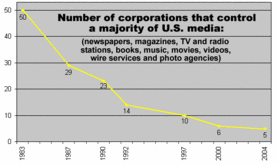
The net in the U.S. is so slow even the mainstream media have finally noticed:
The USA trails other industrialized nations in high-speed Internet
access and may never catch up unless quick action is taken by
public-policymakers, a report commissioned by the Communications Workers
of America warns.
The median U.S. download speed now is 1.97 megabits per second — a
fraction of the 61 megabits per second enjoyed by consumers in Japan,
says the report released Monday. Other speedy countries include South
Korea (median 45 megabits), France (17 megabits) and Canada (7 megabits).
“We have pathetic speeds compared to the rest of the world,” CWA President
Larry Cohen says. “People don’t pay attention to the fact that the
country that started the commercial Internet is falling woefully behind.”
—
U.S. Net access not all that speedy,
By Leslie Cauley, USA TODAY,
posted 25 June, updated 26 June 2007
Of course, we’re not going to get internationally competitive speeds until
there are some serious structural changes in the ISP “marketplace”, producing more competition somehow.
And
broadband isn’t the point; Internet access is.
Plus
speed alone is trivial; without choice and participation it’s nothing.
But speed helps draw in participants, and once we’re online, speeds
lets us do more things.
So it’s good that USA Today is paying attention;
maybe its readers will, too.
Then maybe they’ll ask for something better than two turtles.
-jsq
 The U.S. Federal Trade Commission (FTC)
says there’s no need for net neutrality:
The U.S. Federal Trade Commission (FTC)
says there’s no need for net neutrality:








